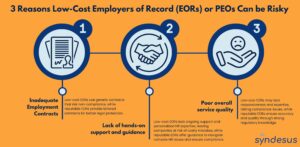When companies expand their operations into new countries where they don’t already have an office, whether Canada or elsewhere around the world, they face various challenges, including navigating complex labor laws, tax regulations, and cultural nuances. To alleviate these burdens, many organizations turn to Employer of Record (EOR) services, which act as the legal employer for their staff in the new location.
Working with an EOR, of course, comes at some cost, and thus the appeal of low-cost EOR providers is understandable. However, while cost is inevitably a factor in any business decision, it shouldn’t be the sole consideration when selecting an EOR partner. Companies must carefully evaluate the potential pitfalls associated with low-cost EOR services, as they can jeopardize compliance, employee satisfaction, and the overall success of their international expansion efforts.
This article will explore three reasons why working with a low-cost EOR service can be risky for companies seeking to hire remotely in Canada and why long-term sustainability should be considered over short-term cost savings. Let’s dive in.
Problems that can arise when working with a low-cost employer of record or PEO
EOR services play a crucial role in facilitating the hiring and management of remote employees. However, in the pursuit of cost savings, organizations may be tempted to opt for low-cost providers, overlooking the potential risks associated with this decision. These risks aren’t always immediately obvious but can cause big complications down the line.
Here are three reasons why working with a low-cost EOR service isn’t always the best business choice and why working with an experienced provider — who may have higher prices — is worth it in the long run.

1. Inadequate employment and other legal contracts
Low-cost EOR providers will often use basic, cookie-cutter employment contracts that may ultimately fail to fully protect the interests of both the US company and the remote worker. Employment contracts are legally binding agreements that govern the relationship between an employer and an employee, and they must comply with the specific labor laws and regulations of the country in which the employee is based. It makes sense to work with an expert who knows that country’s regulations well. Employment laws vary across provinces and territories in Canada, and failing to adhere to these laws can result in significant legal and financial consequences. A well-crafted employment contract should clearly outline the terms and conditions of employment, including compensation, benefits, termination procedures, and any other relevant provisions specific to the local jurisdiction.
Using generic, one-size-fits-all contracts, low-cost EOR providers may inadvertently expose companies to risks such as non-compliance with local labor laws, ambiguities in contractual obligations, and potential legal disputes. A reputable EOR partner on the other hand, which may be slightly more expensive, will ensure that employment contracts are tailored to the company’s specific needs and the local legal requirements, providing a solid foundation for a successful employer-employee relationship.
2. Lack of hands-on support and guidance
Another significant risk associated with low-cost EOR services is the lack of ongoing support. These providers often prioritize a high volume of clients over a more personalized service, leaving companies without immediate access to HR expertise when issues arise.
When hiring remotely in a new country, companies can encounter challenges, such as terminations, performance issues, legal questions, and cultural nuances. In these situations, having access to knowledgeable and experienced HR professionals can be invaluable. A reputable EOR partner should serve as a true consultative partner, providing ongoing guidance to ensure compliance with local laws, mitigate risks, and foster a positive work environment.
Low-cost EOR providers, on the other hand, often offer limited support and fail to provide the personalized attention needed to navigate complex HR matters effectively. This lack of attention can leave companies vulnerable to costly mistakes, legal issues, and employee dissatisfaction, ultimately jeopardizing their success in the new, remote location.
3. Poor overall service quality
Low-cost EOR providers usually need to employ cost-cutting measures out of necessity, which can often lead to subpar service across various aspects of their operations. These providers may compromise on responsiveness, attention to detail, and expertise in local regulations to maintain their low-cost model. However, attention to detail is essential when it comes to EOR services.
Inaccuracies in payroll calculations, tax filings, or compliance documentation can lead to huge problems, including financial penalties, legal issues, and reputational damage. Additionally, a lack of responsiveness can hinder effective communication and collaboration, leading to delays and frustrations for the company and its remote employees. Low-cost EOR providers may also lack the necessary expertise or fail to invest in staying up-to-date with changing laws and best practices, putting companies at risk of non-compliance and potential legal liabilities.
On the other hand, a reputable, full-service EOR provider prioritizes service quality, responsiveness, and regulatory expertise. These providers invest in their personnel, processes, and technology to ensure seamless operations, accurate data management, and ongoing adherence to local laws and regulations.
Prioritizing quality EOR services is a better long-term approach
While the appeal of low-cost EOR services is undeniable, especially for companies seeking to minimize their expenses, the risks associated with these providers can outweigh any perceived cost savings. Inadequate employment contracts, lack of hands-on support and guidance, and poor overall service quality are just a few of the potential pitfalls that companies may encounter when working with low-cost EOR providers.
Investing in a quality, full-service EOR partner may initially seem more expensive, but it can ultimately prove to be the smarter long-term approach. A reputable EOR provider will not only ensure compliance with local laws and regulations but also serve as a valuable consultative partner, providing ongoing support, guidance, and expertise to navigate the complexities of hiring and managing a remote workforce. Striking the right balance between cost and comprehensive service ultimately pays off in the end.
Syndesus provides comprehensive EOR services in Canada
Syndesus provides a hands-on EOR solution that helps US companies that don’t have an office in Canada leverage Canada’s tech talent and favorable immigration laws for tech workers, whether those companies are small US startups or large corporations.
Hiring workers remotely in Canada through Syndesus means that the immigration, payroll, HR, tax, and other administrative processes are taken care of for you while you focus on expanding or retaining your talented workforce.
Reach out to us to learn more about how we can help you hire and retain talent remotely in Canada.

About Marc Pavlopoulos
Marc Pavlopoulos is the CEO and Founder of Syndesus, a Professional Employer Organization that provides PEO services for US companies seeking to employ workers remotely in Canada, builds engineering teams in Canada for VC-backed startups in the US, and set-up remote offices in Canada for US companies. Additionally, Syndesus can assist foreign-born tech workers (and their US employers) with options for working remotely in Canada if they cannot stay in the US due to immigration/work visa issues.
As an American who has moved to Canada twice (for grad school and for work), Marc understands the challenges involved in starting a new life in a new country. Marc is a son of an immigrant and has great respect for people who leave their home country and seek a better life in the US or Canada.
Marc’s goal is to do everything he can to help those individuals achieve their dreams. Marc also has a second venture (Path to Canada) which helps foreign-born technical workers who cannot stay in the US (for immigration reasons) get a job and work authorization to work in Canada.


